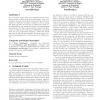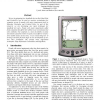118
click to vote
UIST
2010
ACM
15 years 6 days ago
2010
ACM
Computer users with motor impairments face major challenges with conventional mouse pointing. These challenges are mostly due to fine pointing corrections at the final stages of t...
132
click to vote
CORR
2007
Springer
15 years 2 months ago
2007
Springer
In our society, people with motor impairments are oftentimes socially excluded from their environment. This is unfortunate because every human being should have the possibility to...
118
click to vote
ICDCSW
2003
IEEE
15 years 7 months ago
2003
IEEE
We are investigating how handheld devices like Palm PDAs and PocketPCs can be used as assistive technologies for computer access by people with motor impairments such as Muscular ...
112
Voted
CHI
2003
ACM
16 years 2 months ago
2003
ACM
People with motor impairments often cannot use a keyboard or a mouse. Our previous work showed that a handheld device, connected to a PC, could be effective for computer access fo...
107
Voted
CHI
2008
ACM
16 years 2 months ago
2008
ACM
We evaluate two systems for automatically generating personalized interfaces adapted to the individual motor capabilities of users with motor impairments. The first system, SUPPLE...


